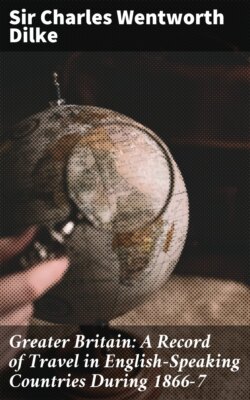Читать книгу Greater Britain: A Record of Travel in English-Speaking Countries During 1866-7 - Sir Charles Wentworth Dilke - Страница 20
На сайте Литреса книга снята с продажи.
ОглавлениеPeace commissioners are yearly sent from Washington to treat with hostile tribes upon the plains. The Indians invariably continue to fight and rob till winter is at hand; but when the snows appear, they send in runners to announce that they are prepared to make submission. The commissioners appoint a place, and the tribe, their relatives, allies, and friends, come down thousands strong, and enter upon debates which are purposely prolonged till spring. All this time the Indians are kept in food and drink; whisky even is illegally provided them, with the cognizance of the authorities, under the name of “hatchets.” Blankets, and, it is said, powder and revolvers, are supplied to them as necessary to their existence on the plains; but when the first of the spring flowers begin to peep up through the snow-drifts on the prairies, they take their leave, and in a few weeks are out again upon the war-path, plundering and scalping all the whites.
Judging from English experience in the north, and Spanish in Mexico and South America, it would seem as though the white man and the red cannot exist on the same soil. Step by step the English have driven back the braves, till New Englanders now remember that there were Indians once in Massachusetts, as we remember that once there were bears in Hampshire. King Philip‘s defeat by the Connecticut volunteers seems to form part of the early legendary history of our race; yet there is still standing, and in good repair, in Dorchester, a suburb of Boston, a frame-house which in its time has been successfully defended against Red Indians. On the other hand, step by step, since the days of Cortez, the Indians and half-bloods have driven out the Spaniards from Mexico and South America. White men, Spaniards, received Maximilian at Vera Cruz, but he was shot by full-blooded Indians at Queretaro.
If any attempt is to be made to save the Indians that remain, it must be worked out in the Eastern States. Hitherto the whites have but pushed back the Indians westward: if they would rescue the remnant from starvation, they must bring them East, away from Western men and Western hunting-grounds, and let them intermingle with the whites, living, farming, along with them, intermarrying, if possible. The hunting Indian is too costly a being for our age; but we are bound to remember that ours is the blame of having failed to teach him to be something better.
After all, if the Indian is mentally, morally, and physically inferior to the white man, it is in every way for the advantage of the world that the next generation that inhabits Colorado should consist of whites instead of reds. That this result should not be brought about by cruelty or fraud upon the now existing Indians is all that we need require. The gradual extinction of the inferior races is not only a law of nature, but a blessing to mankind.
The Indian question is not likely to be one much longer: before I reached England again, I learnt that the Coloradan capital had offered “twenty dollars a piece for Indian scalps with the ears on.”
